The existence of distributed teams grew precipitously in the early 2020’s, which means that we’re still bringing order to the chaotic hiring of distributed teams from that time. While remote teams can be focused, dynamic, and super collaborative, you must tune your interview questions to understand whether prospective employees have the skillset and discipline to make your remote team successful.
We’ve put together eight essential interview questions you should be asking remote workers. These questions will uncover a candidate’s…
- Experience, including their knowledge of your industry and their working style.
- Communication skills, including how they handle conflict and contribute to your company culture when working from home.
- Initiative, including their ability to solve problems when they can’t just cross the office to ask a question.
- Motivation, including the ways they stay on task with minimal supervision and their strategies for avoiding burnout.
- Personality, as you get to know their approach to work, their priorities, and how they’ll fit into your existing team.
When you need to conduct remote interviews for your company, Vocal Video gathers asynchronous screening interviews to help you find and engage the most promising candidates, whenever they have time and wherever they are in the world. You’ll see their authentic responses to questions tailored to the role and gain a fantastic resource for comparing all the potential employees in your pool of applicants.
Find out more about Vocal Video by skipping ahead here, or read on for our list of interview questions for remote workers.
Essential Questions to Ask in an Interview for a Remote Role
In many ways, recruiting employees for a remote role is no different from interviewing people who will come to work in-person.
You’ll probably start with common interview questions like “Tell me something about yourself,” or “What responsibilities do you have in your current role?” Whether a job seeker will ultimately come to work in an office setting or not, your priorities are to learn about their skills and experience in your industry so you can judge how they’d gel with your existing team.
But remote interviews have to go further, too. In your limited time with the interviewee, you should also ask specific questions about how they handle the challenges of working as part of a team when their only regular contact is through their computer.
There’s a common stereotype that remote workers can be introverted or disorganized. In truth, if someone has already been successful in a remote role, they might have more effective communication, time-management, and problem-solving skills than the people that go to an office every day.
These skills and strategies are essential for working remotely long-term, and they can be invaluable for your organization, too. It’s just a matter of finding the people who excel under these conditions and hiring them before one of your competitors does.
With that in mind, let’s look at the key questions that can help you zero in on the candidates best suited for the remote roles at your company. For every question, we’ll cover…
- The benefits of adding this question to an interview for a remote position.
- Answers that could indicate a promising candidate.
- Follow-up questions to use in a live interview to find out more about a candidate’s strengths and strategies.
1. Can You Share Why You’re Interested in This Role?
This tried-and-tested interview question is a classic for a reason.
It gets straight to the point without being confrontational, and it quickly separates the candidates who are serious about the role from those who’ve sent out blanket applications. This is especially important when you’re interviewing people who might be more interested in the work-from-home arrangement than your company’s vision and values.
As a bonus, any applicant who’s spent time preparing for their interview will already have an idea of what they want to say here. This means the question helps them settle in and feel confident in the interview, so they’ll give their best answers and show you more of their personality.
Green flags from top candidates: You’ll get the best answers from people who’ve prepared for the interview and done their research on your organization. They should also show you that their priorities align with those of your company and your existing team.
Most importantly, the best answers should make you feel the remote arrangement is a bonus or an opportunity to do a job they’re really excited about despite the distance, rather than the only reason they applied.
“Can you share why you’re interested in the role?” is also the first question in Vocal Video’s Remote Video Interview template.
This template is a great tool for recruiters who want to conduct asynchronous video interviews to find the top candidates in their pool of applicants.
We’ll explain how to use this template, or create a remote interview from scratch, later.
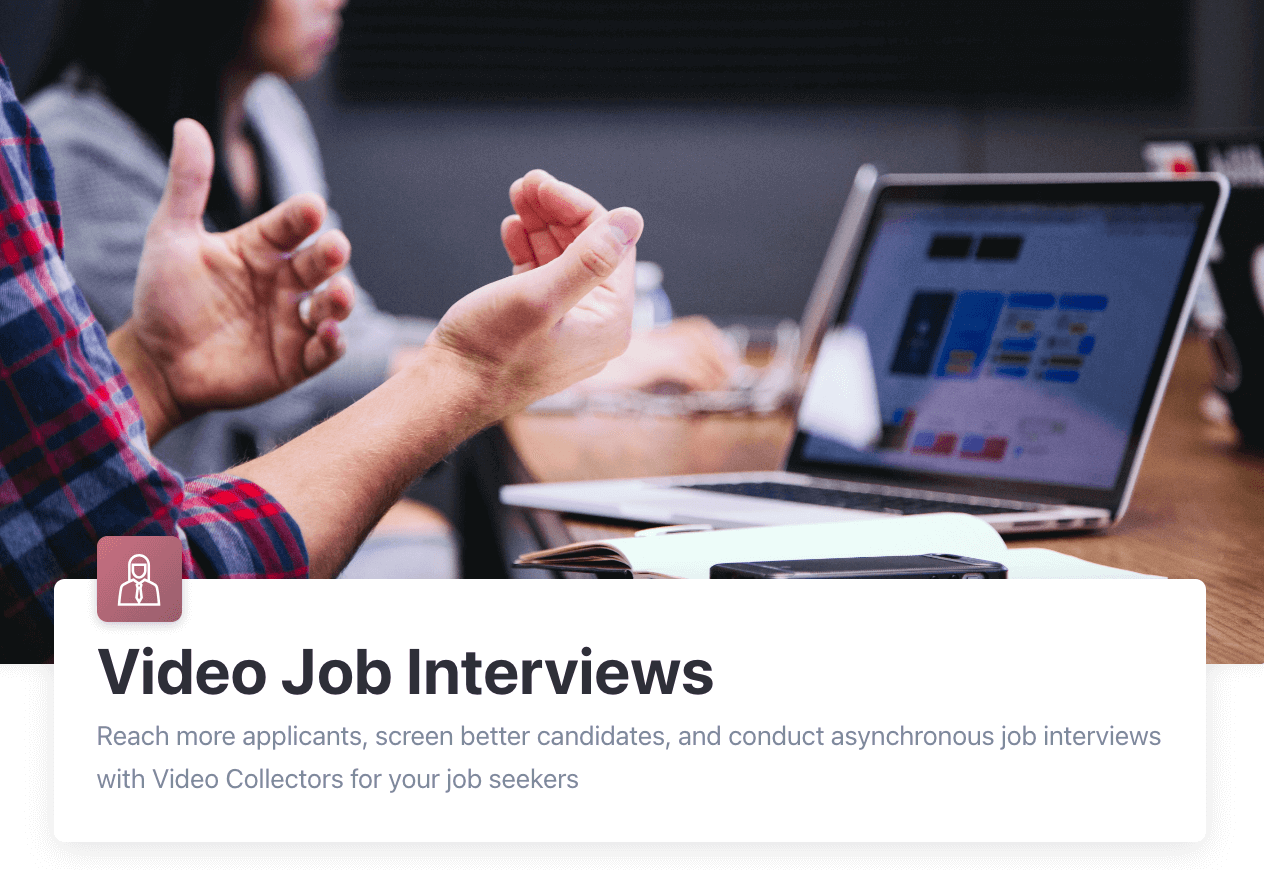
2. Have You Worked Remotely Before?
It’s not a reason to count someone out, but candidates who are new to remote work can take longer to learn the strategies needed to work effectively. This question lets you gauge the level of support they might need as they adjust to a new arrangement.
Green flags from top candidates: The best candidates here may already have remote work experience, either as freelancers or as part of a distributed team. They’ll be able to give you concrete examples of the things they’ve achieved and show they understand challenges like scheduling, asset-sharing, and team-building remotely.
If your company is spread across different time zones, experience in a similar organization is another plus. This setup comes with more potential hurdles and needs someone who can work with even more flexibility, adaptability, and independence.
Find out more with follow-up questions:
- What aspects of remote work do you enjoy?
- What are the main challenges of remote work from your point of view, and how would you deal with them?
- The core work hours at our company are [9:00am–4:00pm EST]. Will you be available during these hours?
Note: The other question recruiters often ask here is, “Why do you want to work from home?” But we find this question pretty combative.
It can give the impression remote work is something the candidate shouldn’t prioritize, and your company would rather they spend their workday in a traditional office environment. Likewise, “Where do you prefer to work?” can show a lack of trust in the candidate’s ability to do their best work from their home office. We think both these questions are best avoided if you want to make a good impression on an experienced remote candidate.
3. How Would You Describe Your Communication Style?
Remote workers can sometimes spend a lot of time alone. In some ways, this makes it even more important to find someone with good communication skills, both in writing and on video calls. Otherwise, members of your remote team can be left feeling frustrated or out of the loop, and it’s harder to build a positive work environment.
For example, you need someone who can tread the line between clarity and insensitivity as they leave comments in shared documents, and who can build relationships through email messages, which will never have the nuance of an informal conversation in the break room.
Green flags from top candidates: Remote workers should be proactive communicators. They’ll ask questions while there’s still plenty of time to answer them, make sure they have everything they need before they start a task, and make a concerted effort to get to know their colleagues even if they never meet face to face.
Someone who already has experience with remote work communication tools, like Slack, Trello, Asana, or the project management platform your company uses, is a plus. At the very least, the candidate should have the technical know-how and willingness to learn a new tool.
Find out more with follow-up questions:
- What challenges did you experience when working with the remote team? How did you overcome them?
- What collaboration and messaging tools have you used in your previous jobs?
- How do you get to know your teammates in a remote environment?
4. How Would You Handle Conflict with a Colleague or Client When Working Remotely?
When you don’t see your teammates face-to-face and your only communications are about the work you share, smaller issues can start to build up. Sometimes, the best candidates for remote positions are those with the soft skills to address conflict head-on rather than pushing forward when something just isn’t clicking.
Green flags from top candidates: Look for candidates who understand the potential conflicts and miscommunications that can arise in a distributed team, even if they haven’t experienced them firsthand. Examples and anecdotes are particularly useful here, as they show the candidate can reflect on and learn from difficult experiences.
Find out more with follow-up questions:
- Can you tell me about a time when you experienced a difficult situation with a client and how you handled it?
5. How Do You Prefer to Give and Receive Feedback at Work?
Because distributed teams don’t share a physical space, reviews and feedback are often quite formal. There might even be a fixed workflow that everyone in the team uses to keep their work consistent and compliant.
This structured approach doesn’t suit everyone’s working style, so it’s important to notice how a potential remote employee reacts to this question in their interview.
Green flags from top candidates: Remote candidates should be open to receiving and applying feedback and great at giving feedback to others. Again, knowledge or experience of the systems you use here is a plus, and a willingness to learn and adapt is essential.
Find out more with follow-up questions:
- Which feedback, review, or collaboration tools have you used before?
- How do you take note of and learn from the feedback you receive at work?
6. How Would You Cope with Minimal Supervision from Your Team Lead?
Remote workers have to be able to solve problems and work productively without the “positive peer pressure” of the office or daily check-ins with their manager.
This includes the obvious challenges of task management and time management, but also issues that in-house staff might never face. For example, technical outages can isolate remote workers from the rest of their team, or they might have to wait an entire working day for answers to their questions because of time differences.
This question also gives you an idea of the candidate’s expectations. If they’re looking for a closer (or, conversely, more hands-off) working relationship than you would typically build, you can clarify the arrangement during the interview or shift your focus to different applicants.
Green flags from top candidates: Here, you’re looking for evidence that someone can take the initiative and even keep cool under pressure. In an ideal world, they’d also have a backup plan in place for technical problems, like a spare laptop to use if their main one breaks down before an important client call, or an alternative workspace if there’s construction work outside their home.
Find out more with follow-up questions:
- Could you describe a productive working relationship with your manager?
- How would you handle a mistake while working remotely?
- What would you do if you lost your internet connection and were unable to communicate with your team or a client before an important Zoom call?
7. How Do You Stay Motivated in a Remote Work Environment?
One of your most important tasks in a remote job interview is to separate the applicants who are cut out to work remotely in the long term from those who are likely to leave after a few months.
Even the most experienced remote workers have times when they feel isolated or disconnected from the company they work with. They’ll need all the strategies in-office staff use to stay focused and manage their to-do list, plus additional ways to avoid burnout.
Green flags from top candidates: The most promising candidates here will acknowledge the ups and downs of remote work. You’ll want to find someone who’s a natural self-starter and who’s excited to make connections with the rest of your team. These strengths and relationships can sustain your working relationship, encouraging someone to stay at your company and advance within it, rather than job-hopping to a new remote role.
Find out more with follow-up questions:
- How do you organize your time and set priorities when working remotely?
- Some remote team members work with [a well-known technique like the Pomodoro method or the Getting Things Done system]. Do you have experience with this strategy or others?
8. How Do You Switch Off from Work?
This question serves two purposes. First, it tells you more about the candidate's personality, which is another essential part of the interview process.
Second, it helps you find a candidate with the work-life balance to thrive in a remote setup in the long term. This is especially important if they’re going to be living and working in the same space. They need to have strategies in place, or at least have a realistic plan for how to approach the challenges of working remotely.
Green flags from top candidates: There’s no right answer here — just look for someone who knows themselves well enough to sustain a remote work lifestyle. If they give you a glimpse into what makes them tick by describing interests that other people in your team share, so much the better.
The Biggest Challenge in Interviewing Remote Candidates
One of the biggest problems hiring teams face when recruiting remotely is the sheer volume of applications they get.
Job postings for remote positions tend to attract a lot of candidates, especially when you advertise them on sites like LinkedIn. When a job can be done from anywhere, people apply from everywhere, which means you’ll be left with a lot of resumes from people who aren’t really suitable for the position. Many of them might even have a romantic idea of, for example, quitting their current job and becoming a digital nomad, without the experience to stay motivated and deliver results for your company.
This is where remote screening interviews come in.
Using some of the questions above, you can save time and get to the most promising candidates before another company snaps them up. For example, asynchronous video interviews make your remote hiring process more efficient by…
- Weeding out the candidates who were never interested in the position — they simply won’t record their video.
- Quickly giving you a sense of a candidate’s personality, style, and approach to work.
- Creating an even playing field and comparing the candidates fairly and objectively.
- Gaining a great reference point to refresh your knowledge of each successful candidate before the next round of live interviews.
Vocal Video: The Easiest Way to Collect Remote Interviews
Vocal Video is an end-to-end video interview collection tool that welcomes your candidates to the recruitment process, shows them the questions you’d like them to answer, and records their responses as high-quality, easy-to-use video interviews for you to compare and analyze with your team.
With our user-friendly video interview software, it’s quick and easy to invite every person who applies to your company to record a highly informative screening video.
Here’s an example of a video interview recorded and edited 100% with Vocal Video:
Whether you use our Video Job Interview Template or write your questions from scratch, you can easily add this worthwhile step to your recruitment process today.
Step 1: Build Your Video Interview Collector
Your video collector is the interface you’ll share with your candidates so they can record their responses. Setting up a collector is incredibly simple. Just open your Vocal Video dashboard, click “+ Create,” and select “New Video Collector” to either pull up a template or create your collector from scratch.
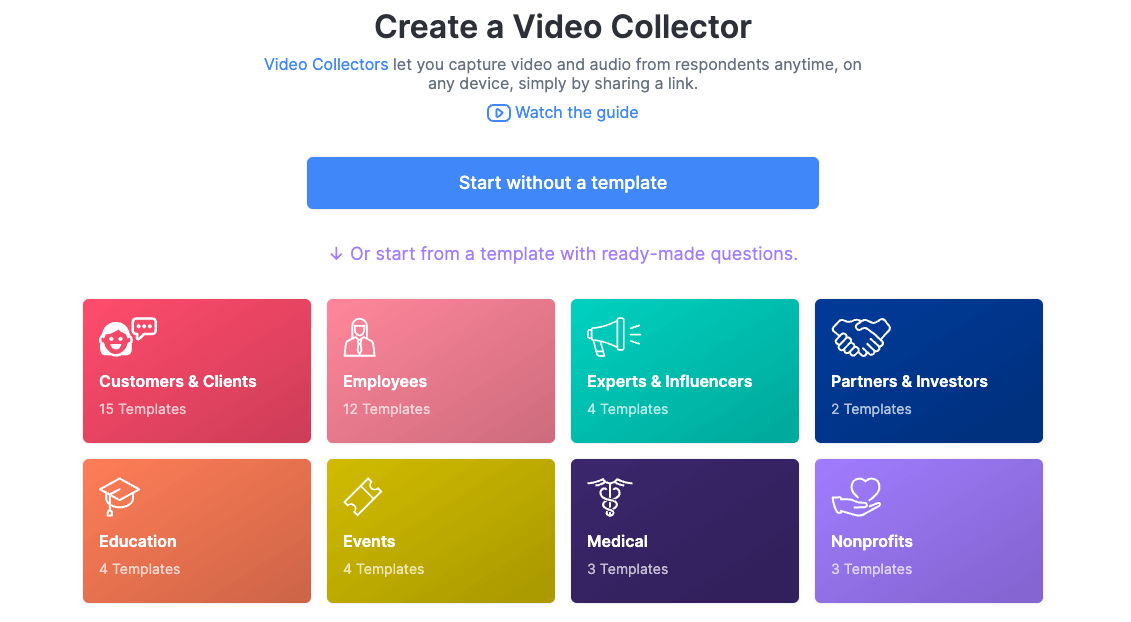
The Video Job Interviews Template we mentioned above includes three pre-written questions for your candidates:
- Can you share why you’re interested in this role?
- Can you (briefly) share about your relevant experience?
- Where do you see yourself in five years?
Naturally, you’ll be able to customize or add to the questions in the collector builder screen.
Whichever option you choose, move through the steps on the left side of the collector builder to name the collector, write or record a welcome message, add up to five questions for your candidates, and write a thank you message letting them know what to expect next and who to reach out to if they have any questions.
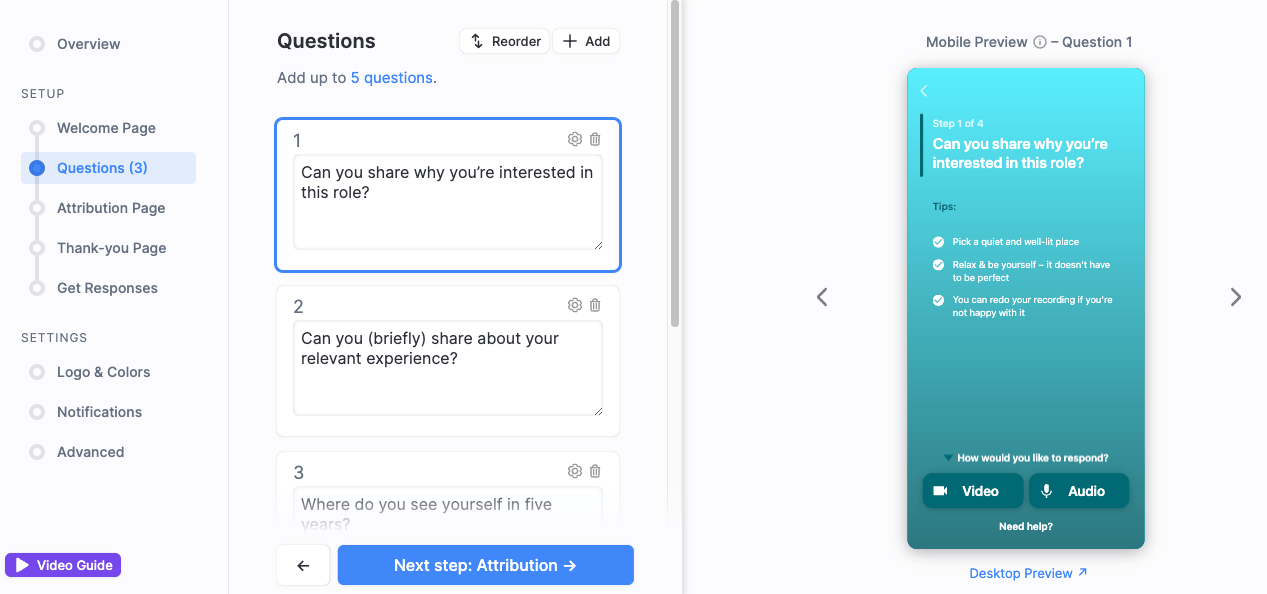
Once you’ve added your logo and your brand colors to the collector, go to “Get Responses.” We’ll automatically generate a URL for you to send to your candidates when they apply.
Step 2: Send the Video Collector to the Candidates
The fastest way to share the link with your applicants is by copying and pasting it into an email or text message. You could even make the collector a permanent part of the careers page of your website to collect speculative applications year-round.
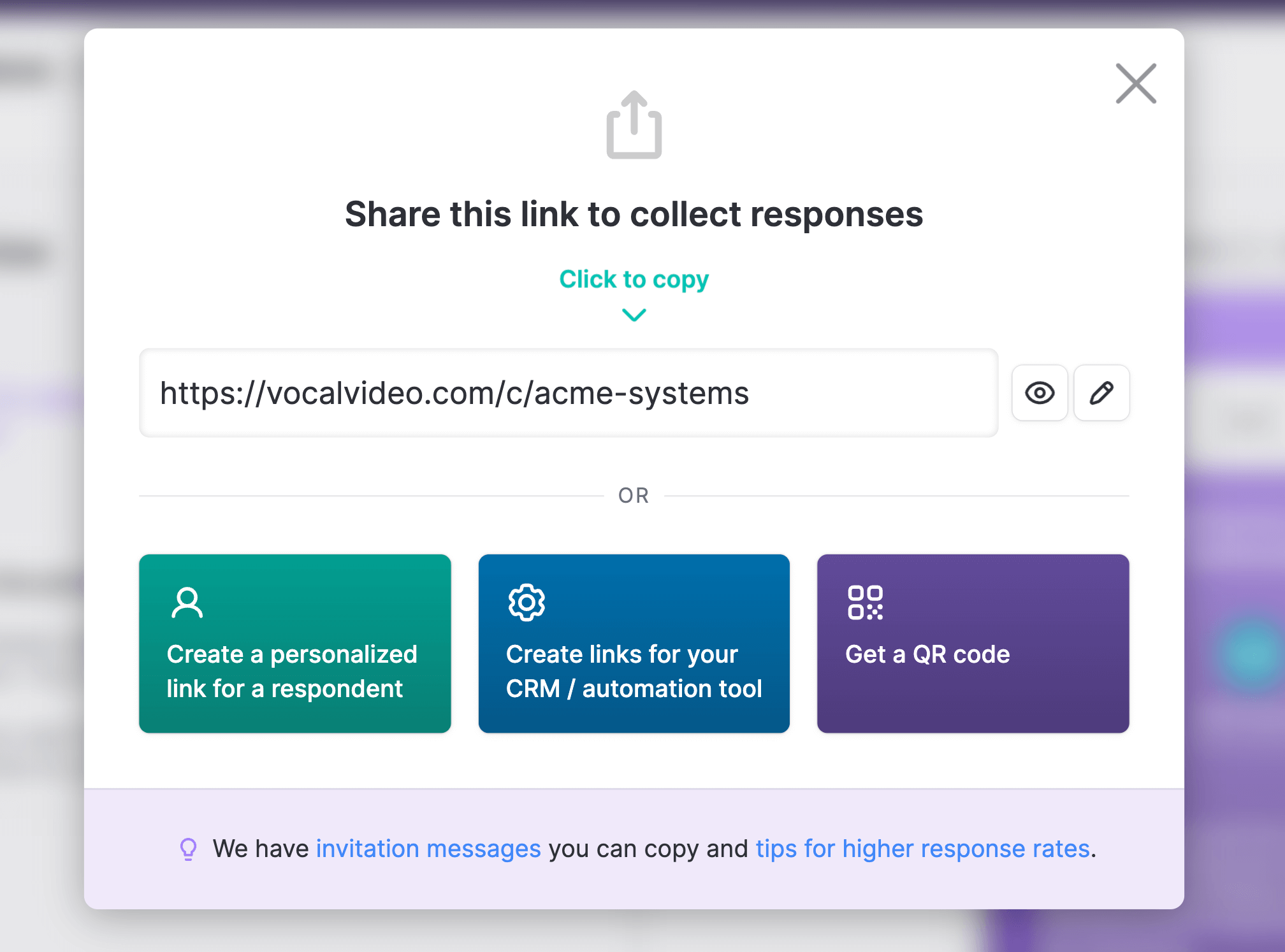
There are also three more sharing options to consider here …
- Create a personalized link. For smaller companies, a personalized link lets you manually input the candidate’s information. Adding this small personal touch can make candidates feel valued during the recruitment process.
- Integrate Vocal Video with your ATS. With our list of Zapier integrations, you can integrate Vocal Video with recruitment platforms like Greenhouse to send the video collector at scale. Find out more in the help center.
- Get a QR code. Creating a QR code to take job hunters straight to your video collector is a great asset for your booth at a job fair, or for any paper marketing materials you hand out at your location.
Once your applicants have the link, they can respond whenever they have time.
This gives them far more flexibility than a live screening interview. Plus, when the first round of the hiring process is asynchronous, your applicants won’t have to schedule an interview around their existing job, so the process is open to even more of the top talent in your industry.
This is what the process looks like from the candidate’s point of view:
- Click the link to open your branded Vocal Video landing page. Applicants can open the link on any of their mobile devices, without downloading an app or creating an account.
- Record their answers one at a time. Applicants can watch the videos back and re-record if they want to change an answer. This helps them present themselves well and gives them the best chance of moving on to the next stage of the process.
- Submit their response. Once they’ve recorded an answer to all the questions in the collector, the applicant clicks “Submit” to send the interview to the video library. There, your hiring managers can take a look and decide who they want to interview in real-time.
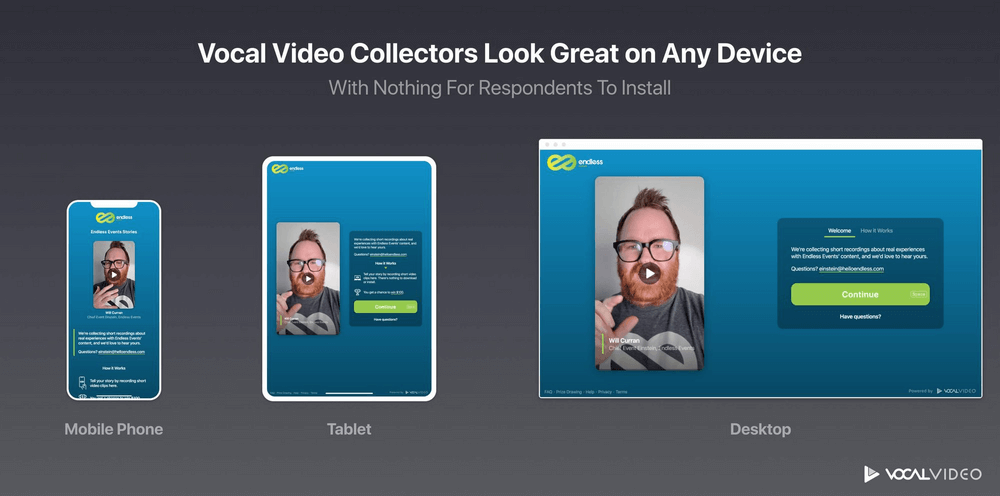
Step 3: Screen Responses in Your Video Library
Every Vocal Video collector can gather unlimited responses, and our unique automatic editing process transforms the interview from raw footage to a pro-style video. We’ll stitch your applicant’s interview together with their name, question cards to separate their answers, and automatically generated subtitles to help you analyze and compare the applications you receive.
Within the video library, your team can search the videos by:
- Filtering video or audio-only responses.
- Filtering by collector. For example, if you have an open position in marketing, and another in accounting, you can set up a separate interview collector for each department and help them quickly locate the videos relevant to them.
- Starring the videos that stand out to your team, so you can quickly reach a decision about who to invite to the next round of interviews.
And, by integrating Vocal Video with the messaging platform your company uses, you can also share video responses to channels on Slack, to Google Drive, or to your ATS effortlessly.
Write the Best Remote Job Interview Questions — and Get Stand-Out Answers — with Vocal Video
Interviews for people who work remotely need to tell you everything you’d want to know about someone who was working at your location, and then go even further. You’ll want to take this opportunity to confirm that someone has a proven track record in a distributed team, or to find out if they’ll be able to cope with the transition to a new way of working on top of the change to a new role.
Effective interviews for remote workers ask questions that focus on the candidate’s:
- Knowledge of your company
- Strategies for organizing their work and staying motivated
- Communication style
- Work-life balance
With a mix of questions like this, you should also get a glimpse of their personality, their interest in connecting with your existing team, and what they have to offer your company. When you start to collect information on these non-negotiables during the initial screening phase of your recruitment process, you can quickly find the best candidates to invite to a live interview.
Sign up for Vocal Video and explore our video interview templates today.